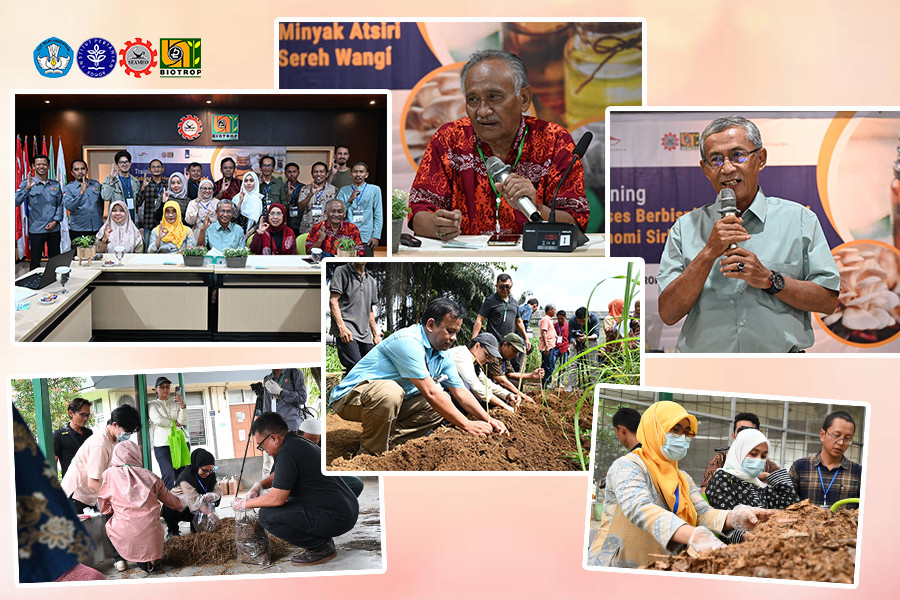In support of the zero waste circular economy sustainability program, the Indonesian Essential Oil Council (DAI), the Center for the Promotion of Imports from Developing Countries (CBI), and SEAMEO BIOTROP conducted the Citronella Circular Economy Essential Oil Business Success Training on 27–28 June 2024 at SEAMEO BIOTROP, Bogor. This training was attended by entrepreneurs, researchers, and practitioners focusing on Citronella.
Essential oils, particularly from Citronella, have immense economic potential as high-value commodities in the international market and as products that support environmental sustainability by applying the circular economy concept. Reducing Citronella waste is crucial to maximize the use of raw materials and produce sustainable economic and environmental benefits.
The Citronella Circular Economy Essential Oil Business Success Training aimed to improve education and technical training in cultivating and managing oyster mushroom derivative products based on Citronella distillation waste, supporting a zero-waste circular economy. The specific objectives included: (1) disseminating research results related to cultivating oyster mushrooms using Citronella oil distillation waste; and (2) training participants in the cultivation and processing of oyster mushrooms into various derivative products.
The training was officially opened by Acting SEAMEO BIOTROP Deputy Director of Administration, Ir. Sri Widayanti, M.Si., who stated that participants would gain new insights and be motivated to contribute to developing an environmentally friendly and sustainable essential oil industry. Mr. Arianto Mulyadi, M.Sc. from DAI, expressed his enthusiasm, saying, "We believe that with the right knowledge, participants can utilize natural resources more wisely and sustainably. This training will not only provide economic benefits for the participants but also contribute to environmental conservation."
Ms. Risa Rosita, M.Si., a training resource person from the Environmental Technology & Security Section (ETS) at SEAMEO BIOTROP, reported that oyster mushroom Bag-log waste at SEAMEO BIOTROP are processed into BIOPOS compost. Compost processing effectively reduces the amount of organic waste entering landfills, supporting circular economy principles. The use of compost supports sustainable agriculture by minimizing environmental impacts and increasing production sustainability. "The practice of cultivating oyster mushrooms using Citronella waste as a substrate is an effort towards achieving zero waste," she said.
Mr. Sugih Mukti from ETS-SEAMEO BIOTROP added, "Oyster mushrooms, which have high economic value as a food source, can be processed into diverse and nutritious derivative products." (Risa Rosita)
Essential oils, particularly from Citronella, have immense economic potential as high-value commodities in the international market and as products that support environmental sustainability by applying the circular economy concept. Reducing Citronella waste is crucial to maximize the use of raw materials and produce sustainable economic and environmental benefits.
The Citronella Circular Economy Essential Oil Business Success Training aimed to improve education and technical training in cultivating and managing oyster mushroom derivative products based on Citronella distillation waste, supporting a zero-waste circular economy. The specific objectives included: (1) disseminating research results related to cultivating oyster mushrooms using Citronella oil distillation waste; and (2) training participants in the cultivation and processing of oyster mushrooms into various derivative products.
The training was officially opened by Acting SEAMEO BIOTROP Deputy Director of Administration, Ir. Sri Widayanti, M.Si., who stated that participants would gain new insights and be motivated to contribute to developing an environmentally friendly and sustainable essential oil industry. Mr. Arianto Mulyadi, M.Sc. from DAI, expressed his enthusiasm, saying, "We believe that with the right knowledge, participants can utilize natural resources more wisely and sustainably. This training will not only provide economic benefits for the participants but also contribute to environmental conservation."
Ms. Risa Rosita, M.Si., a training resource person from the Environmental Technology & Security Section (ETS) at SEAMEO BIOTROP, reported that oyster mushroom Bag-log waste at SEAMEO BIOTROP are processed into BIOPOS compost. Compost processing effectively reduces the amount of organic waste entering landfills, supporting circular economy principles. The use of compost supports sustainable agriculture by minimizing environmental impacts and increasing production sustainability. "The practice of cultivating oyster mushrooms using Citronella waste as a substrate is an effort towards achieving zero waste," she said.
Mr. Sugih Mukti from ETS-SEAMEO BIOTROP added, "Oyster mushrooms, which have high economic value as a food source, can be processed into diverse and nutritious derivative products." (Risa Rosita)
 Friday, 05 July 2024 on 1:51pm
Friday, 05 July 2024 on 1:51pm
